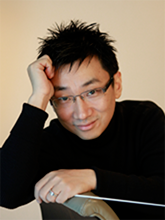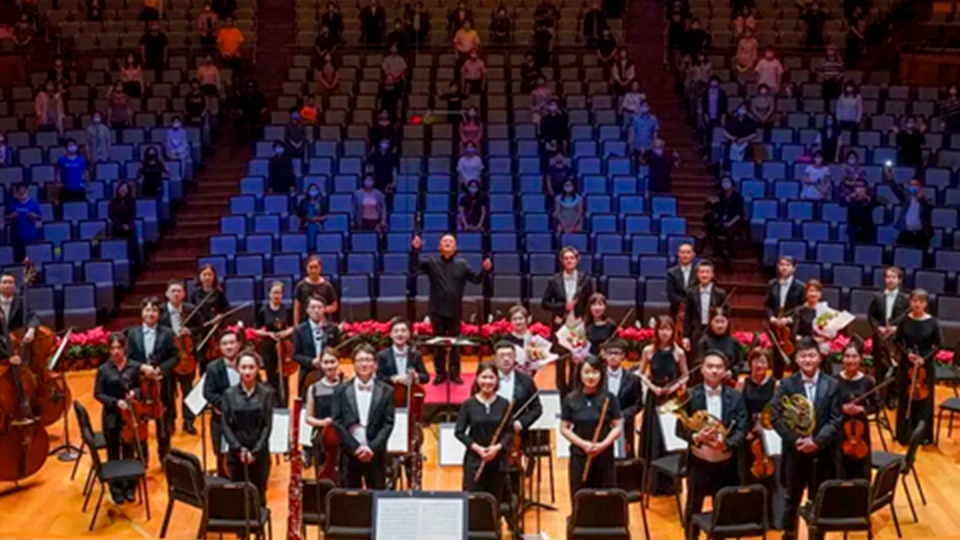2020.05.16 19:30 Concert Hall
Burgeon and Flourish: Britten, Prokofiev and Schoenberg

- LI XincaoConductor
- Benjamin Britten
-
Simple Symphony, Op. 4
I. Boisterous Bourrée
II. Playful Pizzicato
III. Sentimental Saraband
IV. Frolicsome Finale
- Sergei Prokofiev
-
Symphony No. 1 in D major, Op. 25, “Classical”
I. Allegro
II. Larghetto
III. Gavotta: Non troppo allegro
IV. Finale: Molto vivace
- Arnold Schoenberg
-
Verklärte Nacht, Op. 4 (Transfigured Night)
About the concert
Driven by the social changes brought by the Second Industrial Revolution, human civilization made slow but continuous progress, with uncertainty and changes that created classical music stars in the 20th Century.
During the Christmas season of 1933, 20-year-old Britton composed the Simple Symphony, putting eight melodies he wrote during the ages of 9 and 12 into four movements. This piece was originally composed for small students' orchestras. People did not know that the son of a dentist would become the representative of 20th-century British classical music.
Prokofiev, another major figure of 20th-century music, has a style that combines national, classical, and modern elements. On April 21, 1918, Prokofiev conducted the Saint Petersburg Imperial Music Choir (now the Saint Petersburg Philharmonic Orchestra) to present the premiere of his Symphony No.1 in D major, written in imitation of the style of Haydn. The composer named the work "Classical."
In 1889, 25-year-old Schoenberg read Richard Dehmel's poem Verklärte Nacht (Transfigured Night). In three weeks, he finished the string sextet of the same time. In 1917, the piece was orchestrated, and in 1943, it was revised. The poem is about two lovers walking and talking in the woods under the moon. On the night, they are faced with a test of cruel reality. They might break up in anger or find a new start. The poem that touched Schoenberg promotes the individual experience of ups and downs in life to a feeling shared by all human beings.
By Gao Jie
LI Xincao
LI Xincao is Deputy Director and Chief Conductor of China National Symphony Orchestra, member of the 13th National Committee of CPPCC. Since 1999, LI Xincao has led the China National Symphony Orchestra on historical tours around the world and has been enthusiastically received by audiences and musical critics domestically and abroad. In 2004, he won the Award of the First Chinese Youth Achievements from the Communist Young League Central Committee out of 10 candidates.
LI Xincao is Deputy Director and Chief Conductor of China National Symphony Orchestra, member of the 13th National Committee of CPPCC. Since 1999, LI Xincao has led the China National Symphony Orchestra on historical tours around the world and has been enthusiastically received by audiences and musical critics domestically and abroad. In 2004, he won the Award of the First Chinese Youth Achievements from the Communist Young League Central Committee out of 10 candidates.
LI Xincao has also greatly extended the repertoires and conducted over 30 Chinese and western operas. He is now professor and master tutor of Conducting Department of Central Conservatory of Music and China Conservatory of Music.
China NCPA Orchestra is the resident orchestra of the National Centre for the Performing Arts (NCPA), Beijing. Since its founding in 2010, the orchestra has fast established itself as one of the most adventurous and dynamic orchestras in the country and earned an international reputation through extensive performances abroad. Numerous world-renowned artists have collaborated with the orchestra, including Lorin Maazel, Zubin Mehta, Valery Gergiev, Myung-Whun Chung, Christoph Eschenbach, Fabio Luisi, Vladimir Ashkenazy, Leif Segerstam, Gunter Herbig, Shao-Chia Lu, Xian Zhang, Rudolf Buchbinder, Stephen Kovacevich, Khatia Buniatishvili, Lang Lang, Yuja Wang, Haochen Zhang, Kyung-Wha Chung, Vadim Repin, Siqing Lu, NING Feng, Jian Wang, Gautier Capucon, Alison Balsom, Sabine Meyer, Placido Domingo, Leo Nucci, Renee Fleming among many others. Lorin Maazel worked closely with the orchestra before his passing and praised the musicians for their “amazing professionalism and great passion in music”. Christoph Eschenbach also declared it as “one of the finest orchestras in Asia”. Over the years, the orchestra has gained critical acclaim for its artistic excellence in both concerts and operas. To date they have played in over 60 NCPA opera productions, including classical repertoires such as Tristan and Isolde, Die Meistersinger von Nürnberg, Aida, Otello, Nabucco, Tosca, Turandot, The Marriage of Figaro, Don Giovanni, Eugene Onegin, and newly commissioned works Rickshaw Boy, The Long March, Fang Zhimin, The Jinsha River, Visitors on the Snow Mountain and The Dawns Here Are Quiet. Their live recording of The Ring without Words with its creator, Lorin Maazel, was released on SONY Music worldwide, the only recording the great maestro ever made with an orchestra from China. The orchestra has consistently offered creative and diverse programmes through its concert season. As part of its continuous efforts to promote contemporary music, the orchestra presented the China Premieres of major works by John Adams, Toru Takemitsu et al. and gave the World Premieres of dozens of substantial new orchestral works commissioned from composers across the globe, including Qigang Chen, Bright Sheng, ZHAO Jiping, Michael Gordon, Kalevi Aho, et al. It has also played a significant role in the NCPA's Young Composers Programme, providing a unique platform nurturing the next generation of composers in China. The orchestra has consistently offered creative and diverse programmes through its concert season. As part of its continuous efforts to promote contemporary music, the orchestra presented the China Premieres of major works by John Adams, Toru Takemitsu et al. and gave the World Premieres of dozens of substantial new orchestral works commissioned from composers across the globe, including Qigang Chen, Bright Sheng, ZHAO Jiping, Michael Gordon, Kalevi Aho, et al. It has also played a significant role in the NCPA's Young Composers Programme, providing a unique platform nurturing the next generation of composers in China. With its commitment to educational and outreach activities, the orchestra has presented a series of Weekend Matinee Concerts at its home venue, providing local audience specially selected programmes and accessible ticket prices. The orchestra also frequently initiates wide-reaching educational projects in association with educational institutions across the city. In this unpredictable 2020, the NCPAO led by the Music Director LÜ Jia has collaborated with LI Xincao, CHEN Lin, LI Biao, YANG Yang, ZHANG Yi, Siqing Lu, Haochen Zhang and many other artists in presenting online concert series over 5 months period. In November, the NCPAO announced its 2020-21 season after several rounds of adjustments. The new season sees the orchestra’s performances in operas including Fang Zhimin, Visitor on the Snow Mountain, LAN Huahua, and the premiere of the NCPA’s new production of Gianni Schicchi. In celebration of the 250th anniversary of Beethoven’s birth and the 160th anniversary of Mahler’s, Music Director LÜ Jia conducts the NCPAO in Egmont with actor SUN Qiang and a series of classic symphonies and chamber works of the two great composers. The 2020-2021 season features several Chinese artists’ debuts, among them YU Feng, ZHANG Jiemin, Jinxu Xiahou, Jianing Kong, Tianqi Du, and CHEN YUE. Highlights of the season also include the returns of ZHANG Guoyong, YUAN Ding, SONG Yuanming, Xuefei Yang, ZHANG Qiang, LI Jia, and David Wang. As the Composer-in-Focus, ZHAO Jiping’s music will be performed by the NCPAO throughout the season. In February 2012, LÜ Jia took up the post of Chief Conductor, succeeding Zuohuang Chen, NCPA’s then Artistic Director of Music as well as a founder of the orchestra. In January 2017, LÜ Jia started serving as NCPA's Artistic Director of Music and the NCPA Orchestra's Music Director.






